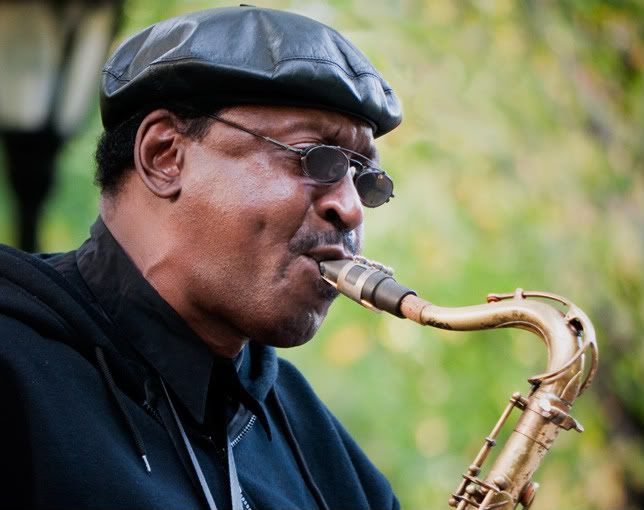I had the pleasure this week of a visit from an old and dear friend, who's been living in Beijing for the last year. Way back in the Cretaceous (the 1980s), he was my college roommate and partner in crime. We had much fun together in those days, and our relationship long ago transcended friend and became family.
 One night this week we wound up watching a pay-per-view documentary on Mike Tyson. Yes, despite our intellectual tendencies, sophisticated pretensions, and supposedly sensitive souls, both of us still get a kick out of watching two guys trying to knock the snot out of each other. Back in his prime, Mike Tyson was the ultimate snot knocker. His story since, though, has been an epic tragedy of almost classical Greek proportions. Here was the most feared and physically powerful man of his time, brought down by inner demons for which his might proved no match, ultimately to become an object of scorn and ridicule. The film's narrative is driven by Iron Mike's own words, and rather than the brutal thug you might imagine him to be, he comes off as an extremely wounded, very agonized human being, and one with a strikingly philosophic take on things.
One night this week we wound up watching a pay-per-view documentary on Mike Tyson. Yes, despite our intellectual tendencies, sophisticated pretensions, and supposedly sensitive souls, both of us still get a kick out of watching two guys trying to knock the snot out of each other. Back in his prime, Mike Tyson was the ultimate snot knocker. His story since, though, has been an epic tragedy of almost classical Greek proportions. Here was the most feared and physically powerful man of his time, brought down by inner demons for which his might proved no match, ultimately to become an object of scorn and ridicule. The film's narrative is driven by Iron Mike's own words, and rather than the brutal thug you might imagine him to be, he comes off as an extremely wounded, very agonized human being, and one with a strikingly philosophic take on things.
You wouldn't expect it from a man sporting a Maori face tattoo, who was convicted of rape, and is infamous for biting off the ear of one of his opponents, but Tyson espoused several insightful ideas that really gave me pause, and left me thinking for days. One of them was the phrase "too soon old, too late smart". I was pretty certain that Tyson didn't originate those words, and a quick Google revealed them to be the title of a self-help book that seems to have garnered some good reviews. Not that I'm recommending the book, as I haven't read it, and I find most self-help books to be crap, the psychological equivalent of a Big Mac. Be that as it may, its title certainly rings true. Too soon old, too late smart. Pretty well sums up the totality of my existence in six syllables.
This week, after several months of wonky stuff going on with my eyes, I finally went to the eye doctor. I'd shrugged off my weird eye shenanigans as another of MS' s many pleasures, as it's well known that Multiple Sclerosis likes to make playthings out of optic nerves. It's been getting increasingly difficult for me to see lately, with my vision getting kind of hazy, and multiple images surrounding any bright object I look at, so, finally, off to the eye doctor I went.
One quick gander into my eyeballs, and I was unceremoniously told that I have cataracts in both eyes, and will need corrective surgery in a few weeks. In the parlance of the Internet, WTF? Talk about "too soon old", what am I, 93? Between progressive MS, cataracts, and the handful of other medical delights that I've been graced with, there's hardly a 93-year-old in the world that would willingly trade bodies with me. It would likely be hard to find even a deceased 93-year-old that would make that deal, if deceased persons could in fact make such deals. They'd probably be like, "Um, thanks, but, um, really, no... I think I'll stick with the fetid rotting corpse, thank you. But best of luck to you...".
On the bright side, cataracts are very treatable, and the doctor said that after surgery I might not even need glasses anymore, but really, when is enough enough? Nothing to do but laugh, at myself, at my predicament, at the universe, at life and all of its peculiarities. It's no wonder that the Buddha is often depicted smiling. The world is nothing more than a stage for a theater of the absurd.
And that brings us to the second half of Mike Tyson's quoted wisdom, "too late smart". If I had only achieved this attitude of bemused detachment earlier in life, I could have saved myself years of heartache and misery. Sure, my newfound knowledge and take on life is serving me well through all the bullshit I now have to deal with, but it would have served me even better when I was healthy. Back then, when I still had the infinite power to redefine and redirect my life in a way of my own choosing, I was instead mired in a thicket of negative emotions and self-defeating attitudes and actions. I managed to achieve a certain level of professional and material success, but never found inner happiness. Now that my life has been redefined and redirected for me, by a completely suck ass disease and its coterie of little friends, I've been forced, too late, to get "smart".
To those healthy folks reading this, and even to those whose MS has been mild, I urge you with every fiber of my being to go to sleep tonight resolved and resolute that when you wake up tomorrow you will begin to conduct, with brutal self honesty, a complete inventory of your past. You will admit all of your mistakes, recognize all of the behaviors and attitudes that have thus far held you back, acknowledge all of the actions of others that have done you harm, and then decide to no longer allow any of it to have a negative impact on your present and future. The only power the past has on you is the power you allow it to have. You must take full ownership of all of the positives that you've experienced and accomplished, learn from all of the negatives, and then kick those negatives to the curb. Forever.
Much easier said than done, I know, but nothing worthwhile ever comes easy. There can be no more important exercise you can undertake. Forget about the stair stepper and the elliptical trainer for a minute, and get your mind right. Wishing won't make it so. This will be hard work. Making an honest assessment of yourself, and taking an accounting of all of the old ways and days that have added up to make you the person who you are now, will likely be very tough and even downright painful. The most difficult form of honesty to practice is self honesty, and it is to ourselves to whom we tell the most destructive lies. Come clean with yourself, own up to all of your past failings and misdeeds, resolve to forgive yourself as well as those who have wronged you, and you can begin to take the steps necessary to create a new and contented reality.
The Hasidic Jews have a proverb the gist of which says that the universe creates itself anew each and every dawn. It's their way of saying that the past has no real influence on the present. If this holds true for the universe, it must also hold true for the individuals in it. The only person that can loosen the grip that the past has on your present is you. Psychologists, spiritual gurus, and wheelchair kamikazes can ultimately only offer advice, it's up to you to make it so. The process should not be without joy, either; exult in your power to transform yourself.
As my grandmother used to say in times of trouble, "Ladies and gentlemen, take my advice. Pull down your bloomers and slide on the ice". Wise words, those, the equal I think to "too soon old, too late smart". I wonder if I could get that message to Mike Tyson...













![Reblog this post [with Zemanta]](http://img.zemanta.com/reblog_e.png?x-id=2c13f93c-0ccd-4771-841b-0d7336a185fd)

![Reblog this post [with Zemanta]](http://img.zemanta.com/reblog_e.png?x-id=8aff2bd3-48b8-43e8-bde8-0708dd98359a)
 One night this week we wound up watching a pay-per-view
One night this week we wound up watching a pay-per-view ![Reblog this post [with Zemanta]](http://img.zemanta.com/reblog_e.png?x-id=d2db3528-f7ec-49bb-9d8b-daaf796055c7)
